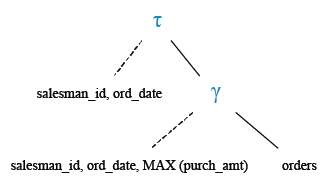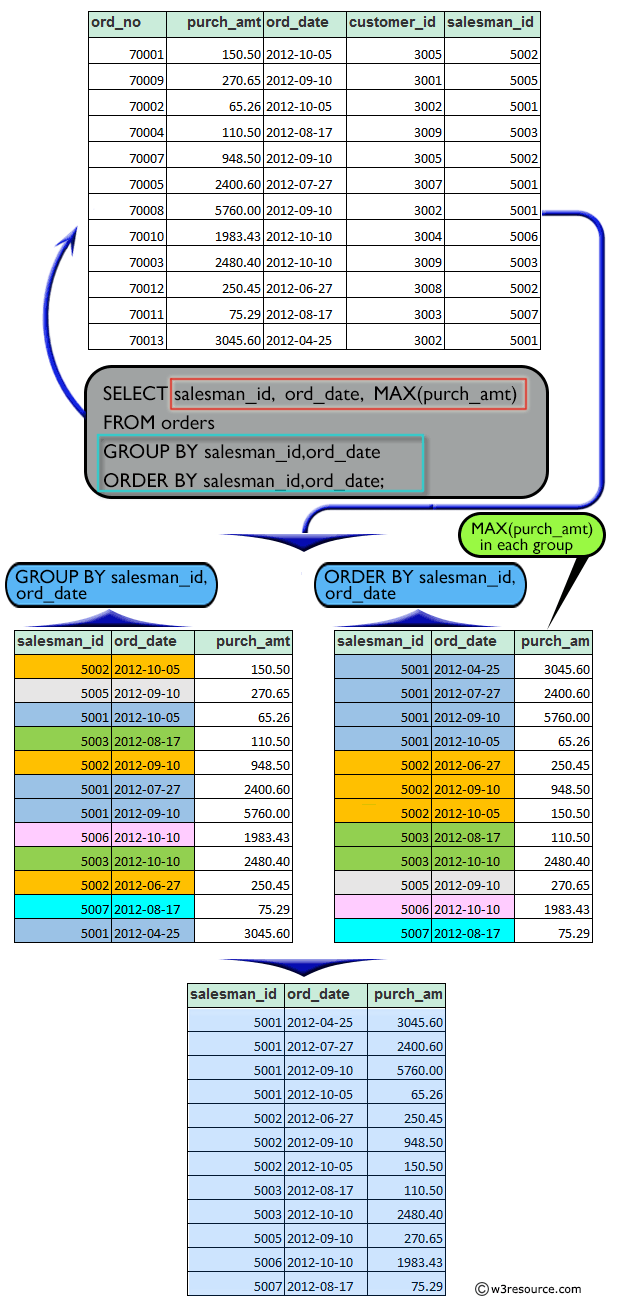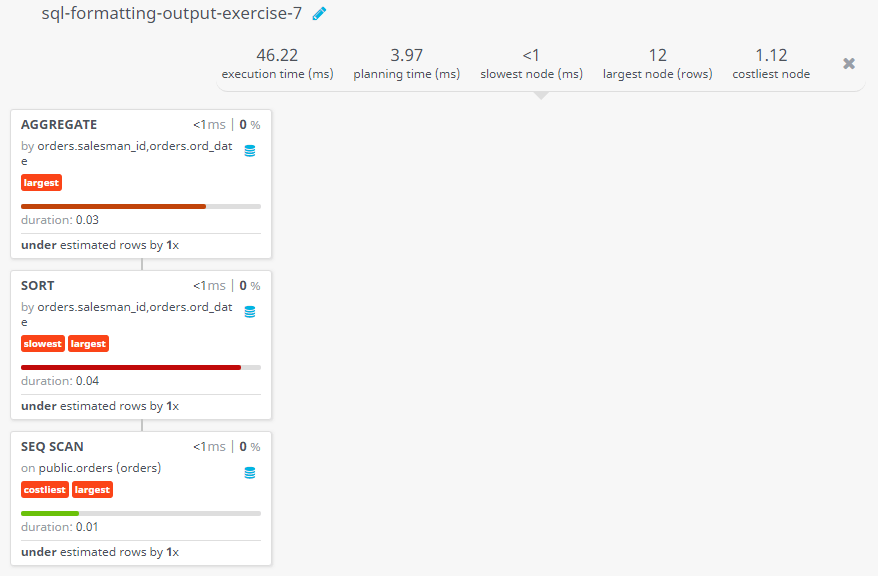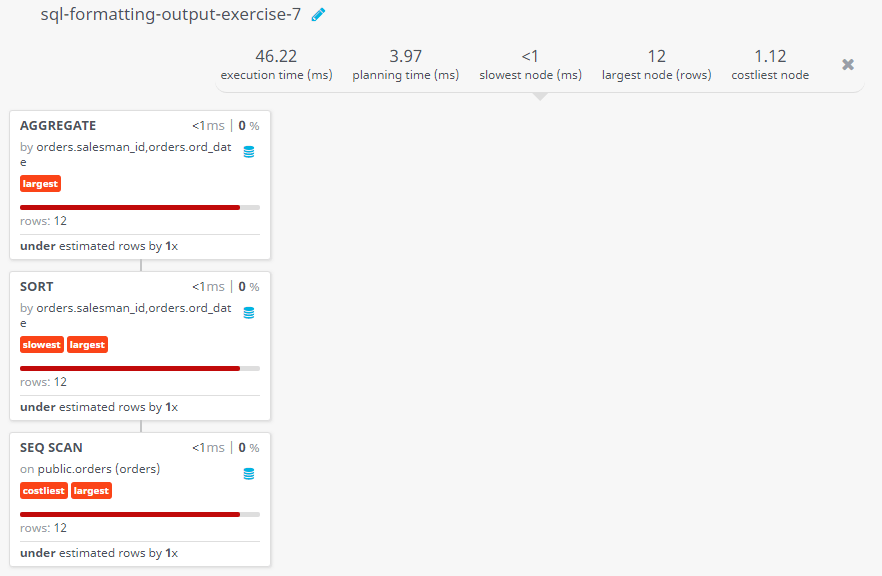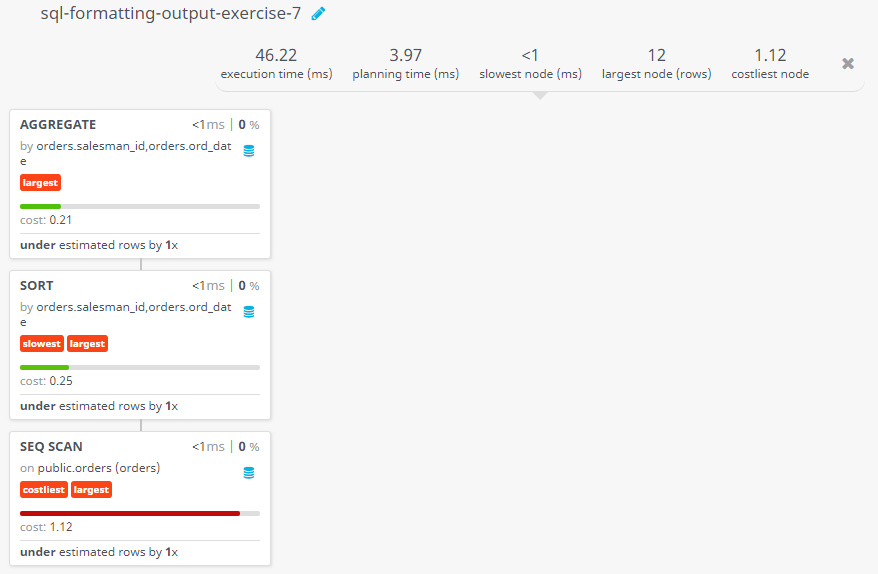SQL Exercise: Salesman details by smallest ID along with order date
Maximum Purchase per Salesperson per Date
From the following table, write a SQL query that calculates the maximum purchase amount generated by each salesperson for each order date. Sort the result-set by salesperson id and order date in ascending order. Return salesperson id, order date and maximum purchase amount.
Sample table: orders
ord_no purch_amt ord_date customer_id salesman_id ---------- ---------- ---------- ----------- ----------- 70001 150.5 2012-10-05 3005 5002 70009 270.65 2012-09-10 3001 5005 70002 65.26 2012-10-05 3002 5001 70004 110.5 2012-08-17 3009 5003 70007 948.5 2012-09-10 3005 5002 70005 2400.6 2012-07-27 3007 5001 70008 5760 2012-09-10 3002 5001 70010 1983.43 2012-10-10 3004 5006 70003 2480.4 2012-10-10 3009 5003 70012 250.45 2012-06-27 3008 5002 70011 75.29 2012-08-17 3003 5007 70013 3045.6 2012-04-25 3002 5001
Sample Solution :
-- This query selects specific columns ('salesman_id', 'ord_date', and the maximum 'purch_amt') from the 'orders' table.
-- It groups the result set by 'salesman_id' and 'ord_date' and orders it in ascending order first by 'salesman_id' and then by 'ord_date'.
SELECT salesman_id, ord_date, MAX(purch_amt)
-- Specifies the table from which to retrieve the data (in this case, 'orders').
FROM orders
-- Groups the result set by 'salesman_id' and 'ord_date' columns.
GROUP BY salesman_id, ord_date
-- Orders the result set in ascending order first by 'salesman_id' and then by 'ord_date'.
ORDER BY salesman_id, ord_date;
Output of the Query:
salesman_id ord_date max 5001 2012-04-25 3045.60 5001 2012-07-27 2400.60 5001 2012-09-10 5760.00 5001 2012-10-05 65.26 5002 2012-06-27 250.45 5002 2012-09-10 948.50 5002 2012-10-05 150.50 5003 2012-08-17 110.50 5003 2012-10-10 2480.40 5005 2012-09-10 270.65 5006 2012-10-10 1983.43 5007 2012-08-17 75.29
Code Explanation:
The said query in SQL retrieves data from the 'orders' table and returns the following columns:
salesman_id
ord_date
The maximum value of the purch_amt column, calculated using the MAX function
A result of this query is grouped based on both the "salesman_id" and the "order_date" columns, as well as being sorted in ascending order based on the "salesman_id" and the "order_date" columns. The result of this query will give the maximum purchase amount for each combination of salesman_id and ord_date.
Relational Algebra Expression:
Relational Algebra Tree:
Explanation :
Visual presentation :
Go to:
PREV : Customers Sorted by ID.
NEXT : Customers Sorted by Third Field.
Practice Online
Query Visualization:
Duration:
Rows:
Cost:
For more Practice: Solve these Related Problems:
- Write a SQL query to group orders by salesman_id and ord_date, calculate the maximum purch_amt, and filter out groups where the maximum is below 100.
- Write a SQL query to retrieve the maximum purchase amount for each combination of salesman_id and ord_date, ordering the results by salesman_id then ord_date.
- Write a SQL query to select the maximum purchase amount per order date for each salesperson, including only those groups with more than one order on that date.
- Write a SQL query to list the maximum purchase amount for each salesman on each ord_date, and include a computed column for the average purchase amount of that group.
- Write a SQL query to output salesman_id, ord_date, and max purch_amt per day, filtering out dates where the count of orders is less than two.
Have another way to solve this solution? Contribute your code (and comments) through Disqus.
What is the difficulty level of this exercise?
Test your Programming skills with w3resource's quiz.


